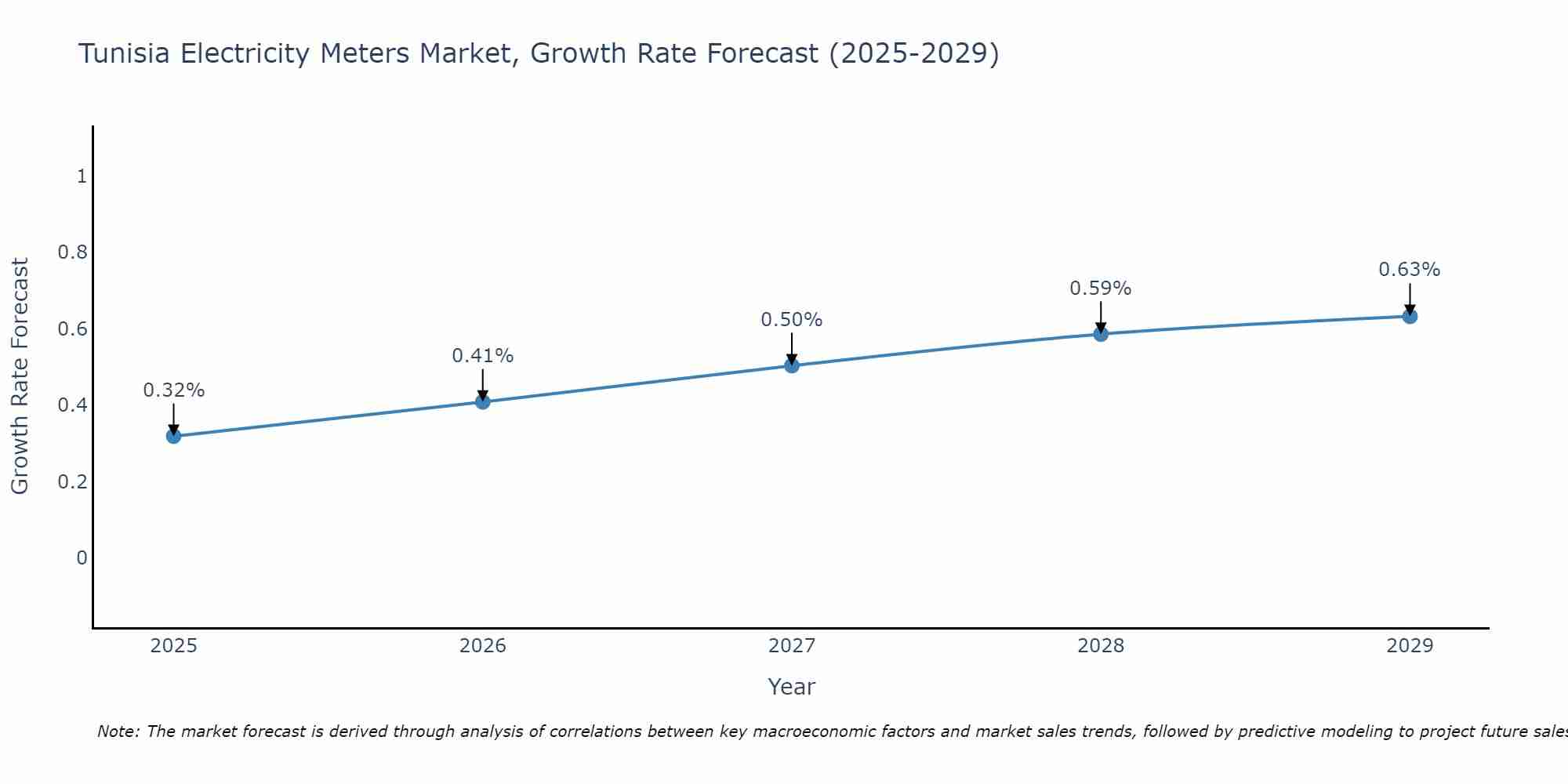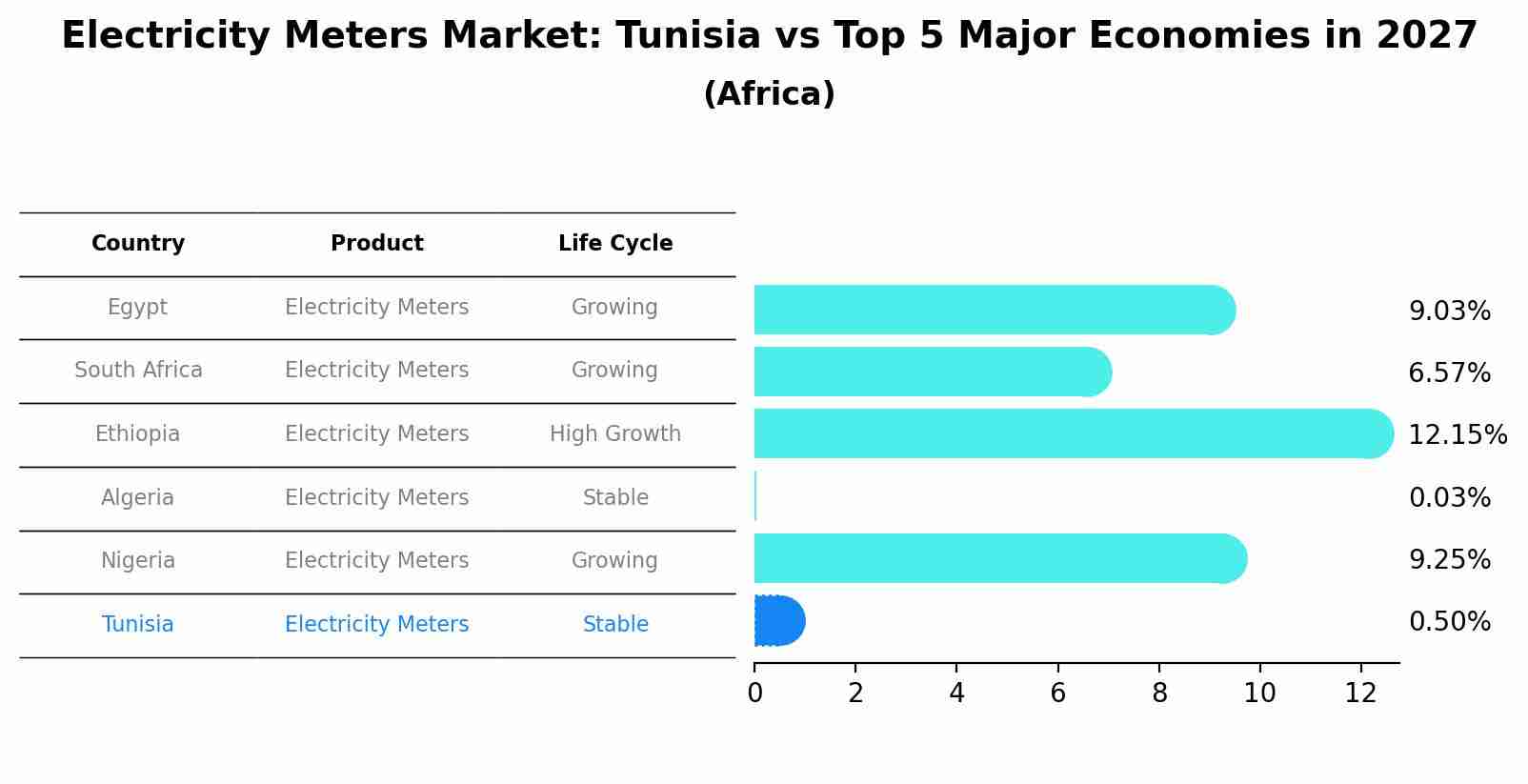Tunisia Electricity Meters Market Outlook | Size, Industry, Value, Share, Trends, Growth, Revenue, Analysis, Companies, COVID-19 IMPACT & Forecast
| Product Code: ETC432950 | Publication Date: Oct 2022 | Updated Date: Jul 2025 | Product Type: Market Research Report | |
| Publisher: 6Wresearch | Author: Dhaval Chaurasia | No. of Pages: 75 | No. of Figures: 35 | No. of Tables: 20 |
Tunisia Electricity Meters Market Size Growth Rate
The Tunisia Electricity Meters Market is likely to experience consistent growth rate gains over the period 2025 to 2029. Commencing at 0.32% in 2025, growth builds up to 0.63% by 2029.

Electricity Meters Market: Tunisia vs Top 5 Major Economies in 2027 (Africa)
Tunisia's Electricity Meters market is anticipated to experience a stable growth rate of 0.50% by 2027, reflecting trends observed in the largest economy Egypt, followed by South Africa, Ethiopia, Algeria and Nigeria.

Tunisia Electricity Meters Market Synopsis
The Tunisia electricity meters market is experiencing steady growth due to increasing urbanization, industrialization, and government initiatives to improve energy efficiency. The market is primarily driven by the rise in electricity consumption, leading to a higher demand for smart and prepaid meters. The government`s focus on renewable energy sources and efforts to modernize the electricity grid are also fueling market growth. Key players in the Tunisia electricity meters market include Landis+Gyr, Itron Inc., and Sagemcom, among others. These companies are investing in research and development to introduce innovative metering solutions that provide accurate data and enhance energy management. The market is expected to continue its growth trajectory, driven by technological advancements and the country`s push towards sustainable energy practices.
Tunisia Electricity Meters Market Trends
The Tunisia Electricity Meters Market is experiencing a shift towards smart meters due to the government`s initiatives to modernize the country`s energy infrastructure. Smart meters offer real-time monitoring, improved accuracy, and remote access features, leading to more efficient energy consumption and billing processes. There is also a growing focus on renewable energy integration, driving the demand for advanced meters that can accommodate solar and wind power generation. Additionally, increasing awareness about energy conservation and sustainability among consumers is influencing the market towards the adoption of smart meters with energy management capabilities. Overall, the Tunisia Electricity Meters Market is witnessing a transition towards smart technology and sustainable practices to meet the evolving energy needs of the country.
Tunisia Electricity Meters Market Challenges
In the Tunisia Electricity Meters Market, several challenges are faced, including issues related to outdated infrastructure, inaccurate billing, and electricity theft. The aging infrastructure in Tunisia poses a challenge in terms of integrating modern smart meter technology, leading to inefficiencies and inaccuracies in meter readings. Inaccurate billing is a significant concern for both consumers and utility companies, as it can result in financial losses and disputes. Additionally, electricity theft is a common problem in Tunisia, leading to revenue losses for utility companies. Addressing these challenges requires investments in upgrading infrastructure, implementing advanced metering solutions, and enhancing regulatory enforcement to combat electricity theft effectively.
Tunisia Electricity Meters Market Investment Opportunities
The Tunisia Electricity Meters Market offers promising investment opportunities for companies involved in smart metering technology, as the government aims to modernize and upgrade the country`s electricity infrastructure. Smart meters enable efficient monitoring and management of energy consumption, leading to cost savings and improved service delivery. Additionally, there is a growing focus on renewable energy sources in Tunisia, creating a demand for advanced metering solutions that can integrate with solar panels and other renewable energy systems. Furthermore, the increasing urbanization and industrialization in Tunisia are driving the need for accurate metering systems to effectively measure and bill electricity usage. Investors can capitalize on these trends by offering innovative smart metering solutions and partnering with local utilities to expand their market presence in the Tunisia Electricity Meters Market.
Jordan Agar Market Government Policies
Government policies related to the Tunisia Electricity Meters Market aim to promote energy efficiency and sustainability by encouraging the use of smart meters and advanced technologies. The Tunisian government has implemented regulations requiring the installation of smart meters to enable remote monitoring of energy consumption, improve billing accuracy, and reduce losses in the electricity distribution system. Additionally, initiatives such as the National Energy Transition Strategy focus on increasing the share of renewable energy sources in the electricity mix, driving the adoption of smart meters to support the integration of intermittent renewable energy generation. These policies create opportunities for market growth in the Tunisia Electricity Meters Market, with increasing demand for smart meters and related services to support the modernization of the electricity grid and enhance energy management practices.
Tunisia Electricity Meters Market Future Outlook
The Tunisia Electricity Meters Market is expected to witness steady growth in the coming years due to increasing investments in modernizing the country`s energy infrastructure and promoting energy efficiency. The government`s focus on renewable energy sources and smart grid technologies is likely to drive the demand for advanced electricity meters. Additionally, rising urbanization and industrialization in Tunisia are expected to contribute to the growth of the electricity meters market as the need for accurate metering and monitoring of energy consumption increases. Technological advancements such as the integration of digital technologies and IoT capabilities in electricity meters are also anticipated to propel market growth. Overall, the Tunisia Electricity Meters Market is poised for expansion, driven by government initiatives and evolving consumer needs for efficient energy management.
Key Highlights of the Report:
- Tunisia Electricity Meters Market Outlook
- Market Size of Tunisia Electricity Meters Market, 2021
- Forecast of Tunisia Electricity Meters Market, 2031
- Historical Data and Forecast of Tunisia Electricity Meters Revenues & Volume for the Period 2018 - 2031
- Tunisia Electricity Meters Market Trend Evolution
- Tunisia Electricity Meters Market Drivers and Challenges
- Tunisia Electricity Meters Price Trends
- Tunisia Electricity Meters Porter's Five Forces
- Tunisia Electricity Meters Industry Life Cycle
- Historical Data and Forecast of Tunisia Electricity Meters Market Revenues & Volume By Type for the Period 2018 - 2031
- Historical Data and Forecast of Tunisia Electricity Meters Market Revenues & Volume By Single Phase for the Period 2018 - 2031
- Historical Data and Forecast of Tunisia Electricity Meters Market Revenues & Volume By Three Phase for the Period 2018 - 2031
- Historical Data and Forecast of Tunisia Electricity Meters Market Revenues & Volume By Analog for the Period 2018 - 2031
- Historical Data and Forecast of Tunisia Electricity Meters Market Revenues & Volume By Smart for the Period 2018 - 2031
- Historical Data and Forecast of Tunisia Electricity Meters Market Revenues & Volume By Application for the Period 2018 - 2031
- Historical Data and Forecast of Tunisia Electricity Meters Market Revenues & Volume By Residential for the Period 2018 - 2031
- Historical Data and Forecast of Tunisia Electricity Meters Market Revenues & Volume By Commercial for the Period 2018 - 2031
- Historical Data and Forecast of Tunisia Electricity Meters Market Revenues & Volume By Industrial for the Period 2018 - 2031
- Historical Data and Forecast of Tunisia Electricity Meters Market Revenues & Volume By Others for the Period 2018 - 2031
- Tunisia Electricity Meters Import Export Trade Statistics
- Market Opportunity Assessment By Type
- Market Opportunity Assessment By Application
- Tunisia Electricity Meters Top Companies Market Share
- Tunisia Electricity Meters Competitive Benchmarking By Technical and Operational Parameters
- Tunisia Electricity Meters Company Profiles
- Tunisia Electricity Meters Key Strategic Recommendations
Frequently Asked Questions About the Market Study (FAQs):
- Single User License$ 1,995
- Department License$ 2,400
- Site License$ 3,120
- Global License$ 3,795
Search
Thought Leadership and Analyst Meet
Our Clients
Related Reports
- Afghanistan Rocking Chairs And Adirondack Chairs Market (2026-2032) | Size & Revenue, Competitive Landscape, Share, Segmentation, Industry, Value, Outlook, Analysis, Trends, Growth, Forecast, Companies
- Afghanistan Apparel Market (2026-2032) | Growth, Outlook, Industry, Segmentation, Forecast, Size, Companies, Trends, Value, Share, Analysis & Revenue
- Canada Oil and Gas Market (2026-2032) | Share, Segmentation, Value, Industry, Trends, Forecast, Analysis, Size & Revenue, Growth, Competitive Landscape, Outlook, Companies
- Germany Breakfast Food Market (2026-2032) | Industry, Share, Growth, Size, Companies, Value, Analysis, Revenue, Trends, Forecast & Outlook
- Australia Briquette Market (2025-2031) | Growth, Size, Revenue, Forecast, Analysis, Trends, Value, Share, Industry & Companies
- Vietnam System Integrator Market (2025-2031) | Size, Companies, Analysis, Industry, Value, Forecast, Growth, Trends, Revenue & Share
- ASEAN and Thailand Brain Health Supplements Market (2025-2031) | Strategy, Consumer Insights, Analysis, Investment Trends, Opportunities, Growth, Size, Share, Industry, Revenue, Segments, Value, Segmentation, Supply, Forecast, Restraints, Outlook, Competition, Drivers, Trends, Demand, Pricing Analysis, Competitive, Strategic Insights, Companies, Challenges
- ASEAN Bearings Market (2025-2031) | Strategy, Consumer Insights, Analysis, Investment Trends, Opportunities, Growth, Size, Share, Industry, Revenue, Segments, Value, Segmentation, Supply, Forecast, Restraints, Outlook, Competition, Drivers, Trends, Demand, Pricing Analysis, Competitive, Strategic Insights, Companies, Challenges
- Europe Flooring Market (2025-2031) | Outlook, Share, Industry, Trends, Forecast, Companies, Revenue, Size, Analysis, Growth & Value
- Saudi Arabia Manlift Market (2025-2031) | Outlook, Size, Growth, Trends, Companies, Industry, Revenue, Value, Share, Forecast & Analysis
Industry Events and Analyst Meet
Whitepaper
- Middle East & Africa Commercial Security Market Click here to view more.
- Middle East & Africa Fire Safety Systems & Equipment Market Click here to view more.
- GCC Drone Market Click here to view more.
- Middle East Lighting Fixture Market Click here to view more.
- GCC Physical & Perimeter Security Market Click here to view more.
6WResearch In News
- Doha a strategic location for EV manufacturing hub: IPA Qatar
- Demand for luxury TVs surging in the GCC, says Samsung
- Empowering Growth: The Thriving Journey of Bangladesh’s Cable Industry
- Demand for luxury TVs surging in the GCC, says Samsung
- Video call with a traditional healer? Once unthinkable, it’s now common in South Africa
- Intelligent Buildings To Smooth GCC’s Path To Net Zero


















